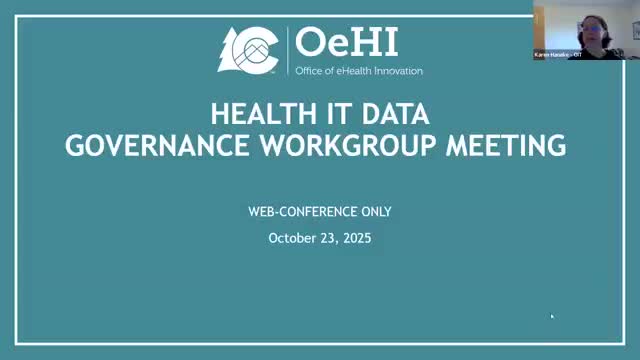Colorado COSHI team rolls out four regional proof-of-concept projects to test data exchange and governance
Get AI-powered insights, summaries, and transcripts
Subscribe
Summary
Colorado Social Health Information Exchange (COSHI) staff described four regional proof-of-concept projects, regulatory and technical governance challenges (including 42 CFR Part 2 and CJIS), and plans for community-facing documentation and partner coordination during an October work group meeting.
Colorado Social Health Information Exchange staff and community partners outlined the launch and early aims of four regional proof-of-concept projects intended to test how social-determinants-of-health data can flow into a statewide exchange while meeting strict privacy rules.
Melissa Gillespie, COSHI project lead, said the initiative uses "a two-pronged approach" with a statewide unifying architecture and regional pilots. "Our key goal of the proof of concept projects is to demonstrate how existing systems can connect bidirectionally with the Colorado Social Health Information Exchange," Gillespie said.
The work group heard that contracts for the pilots executed in July and that kickoff calls occurred in August and September. Amanda Smith, senior project manager for the proof-of-concept portfolio, said the pilots run through June 2028. "The project does run through the June 2028, so it is just shy of 3 years for the total pilot project for our regional proof of concept awardees," Smith said.
COSHI staff described four distinct pilot use cases: two projects focused on supporting individuals with disabilities, one focused on reducing barriers to care for people navigating substance use disorder, and one aimed at reconnecting people exiting incarceration to community services. The pilots were grouped into three architectural models: a dedicated regional exchange or "she broker" platform; direct integration of mature community care-coordination platforms; and a county-driven centralized model that includes custom case-management development.
Karen (COSHI staff) highlighted regulatory risks that the pilots must address, noting that some data types demand extra protections. "42 CFR Part 2 data is also health data...it requires an individual's personal consent to share that data unless there's a medical emergency," she said, and added that criminal justice information (CJIS) carries separate privacy requirements. COSHI staff said the technical platform has been built to support regulatory compliance, but the operational details of minimizing sensitive data exchange and enforcing granular consent will be decided through the pilots.
Participants stressed that governance, trust and community-facing materials are essential to adoption. A recurring recommendation was to publish clear, reusable documentation: an acronym and glossary page, frequently asked questions about consent and data sharing, and an onboarding playbook for future partners. Danny, a meeting participant, urged the COSHI team to prioritize community trust and plain-language communications so that residents understand how data is used and protected.
The group discussed interoperability with existing resource-and-referral systems. Karen said COSHI is exploring integration with systems providers already use, including Find Help and Unite Us, and noted exploratory talks with Denver Health to feed housing data into a Find Help instance. COSHI staff said they are also working on community resource inventory interoperability and have added a fellow to research best practices for mapping and maintaining resource lists.
Speakers emphasized that pilots should share lessons with each other. COSHI staff confirmed they will create regular touch points among awardees to surface redundant work, share technical shortcuts and document stakeholder concerns, successes and barriers. Amanda Smith said each pilot initially identified two to three local partnerships and may add more partners over time.
COSHI staff described anticipated benefits in service coordination: by centralizing referral and status information, they aim to reduce duplicate outreach and allow care coordinators to see whether a client has already started a given application or referral. "We envision a world where the same thing is true for social information and that's what we're trying to support here," Karen said.
The meeting closed with a plan to continue community engagement and to hold a combined November–December meeting (with a tentative virtual date of Dec. 4) and to publish online resources for partners and the public.
The discussion produced no formal votes or policy adoptions during the session.
